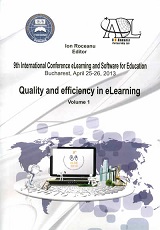E-LEARNING BEHAVIORS AND THEIR IMPACT ON ANDRAGOGY
E-LEARNING BEHAVIORS AND THEIR IMPACT ON ANDRAGOGY
Author(s): Cezar Vasilescu, Aura CodreanuSubject(s): Education
Published by: Carol I National Defence University Publishing House
Keywords: learning behavior; e-learning; andragogic principles; ICT
Summary/Abstract: The assumption underlying this paper is that online environments and, in particular, elearning ones trigger changes in the learning patterns and behaviors of adults. Inherently, that challenges the principles, methods and techniques currently employed in adult teaching and learning in traditional settings. Hence, the aims of the article are three-fold. First, it will focus on delineating the basic concepts that is will use: traditional learning, e-learning, learning behavior, e-learning behavior, andragogy, andragogic principles. Second, it will focus on the basic andragogic principles employed in traditional learning contexts and on their relationship with adult learning behavior. Upon their identification a brief discussion will be undertaken in relation with the way adult learning and teaching occurs in Romania nowadays. The analysis will take into account the extent to which the aforementioned principles are observed, as well as their observable impact on adult learning behaviors. Third, the article will analyze the patterns of adult learning behavior that are likely to occur in elearning contexts and the extent to which these require a review of the andragogic principles for elearning contexts. Thus, the method to be employed in the second part of the article will be based on comparison and contrast between traditional environments and methods of teaching and learning on one hand and online environments for learning. The reasons underlying this research endeavor are as follows. Learning defined in very simple terms refers to the permanent change that occurs in a person’s behavior. What complicates the discussion is actually defining a learning behavior and relating this to adults and the way they learn and the environments that facilitate this. Consequently, the novelty of this article consists in inter-relating the concepts of learning behavior, andragogic principles and elearning. Thus, based on its interdisciplinary approach and findings this article will make a contribution to the fields of andragogy, social sciences and information and communication technology.
Journal: Conference proceedings of »eLearning and Software for Education« (eLSE)
- Issue Year: 9/2013
- Issue No: 01
- Page Range: 126-137
- Page Count: 12
- Language: English

